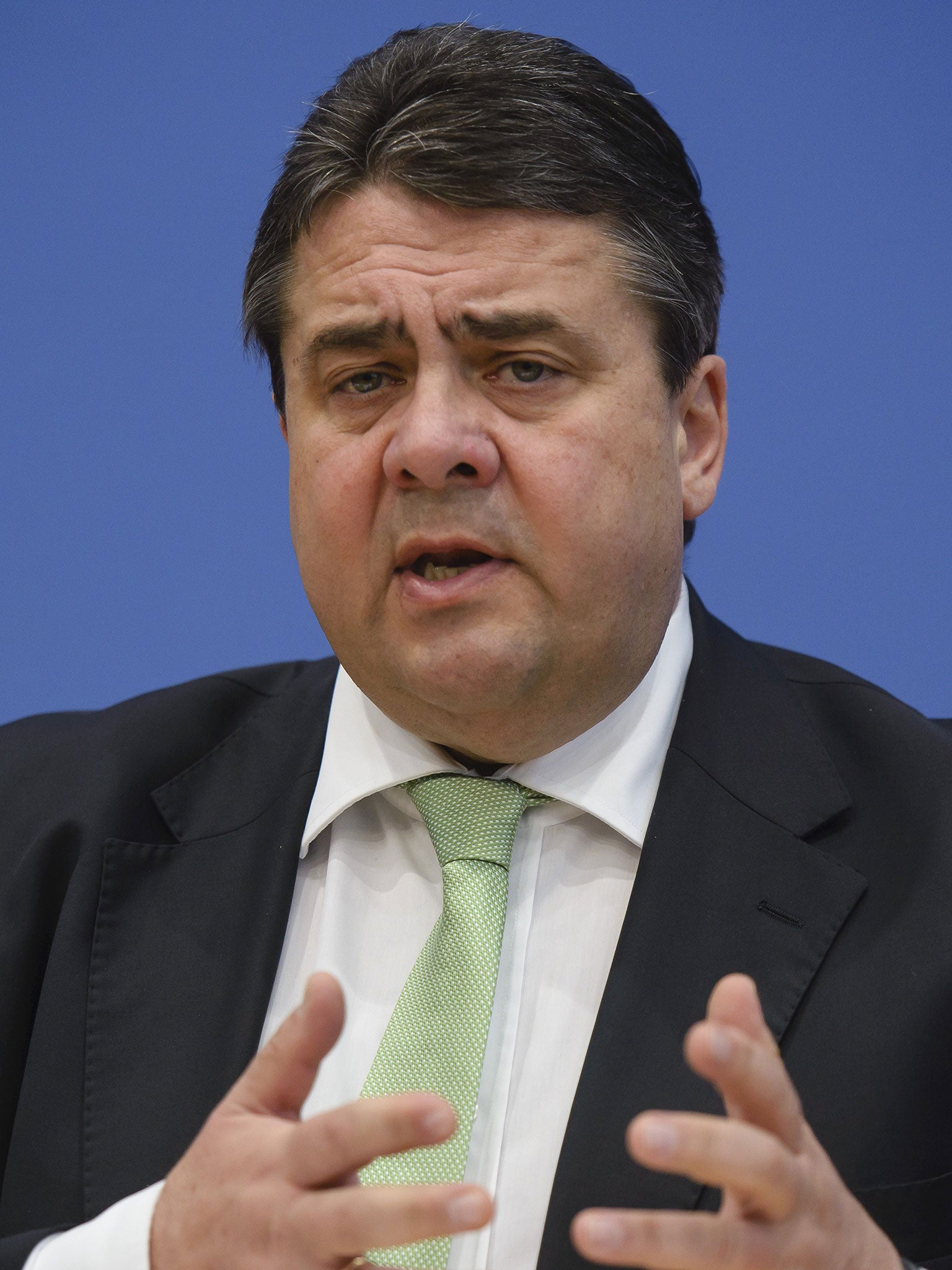Leader who united Germany's centre-left finds ‘Mutti’ Merkel a tougher prospect
Since the SPD’s crushing defeat at the hands of Ms Merkel’s conservatives in an election last September, no German politician has racked up as many political wins as the 54-year-old economy minister

Your support helps us to tell the story
From reproductive rights to climate change to Big Tech, The Independent is on the ground when the story is developing. Whether it's investigating the financials of Elon Musk's pro-Trump PAC or producing our latest documentary, 'The A Word', which shines a light on the American women fighting for reproductive rights, we know how important it is to parse out the facts from the messaging.
At such a critical moment in US history, we need reporters on the ground. Your donation allows us to keep sending journalists to speak to both sides of the story.
The Independent is trusted by Americans across the entire political spectrum. And unlike many other quality news outlets, we choose not to lock Americans out of our reporting and analysis with paywalls. We believe quality journalism should be available to everyone, paid for by those who can afford it.
Your support makes all the difference.The German political landscape is strewn with men who tried to take on Angela Merkel and failed. Sigmar Gabriel, the leader of the centre-left Social Democrats (SPD), is working hard to avoid the same fate.
Since the SPD’s crushing defeat at the hands of Ms Merkel’s conservatives in an election last September, no German politician has racked up as many political wins as the 54-year-old economy minister with keen political instincts and a knack for rousing speeches.
Mr Gabriel is holding his party together in the face of Ms Merkel’s enduring popularity, a necessary first step towards giving the SPD another crack at power, even if it faces a long haul before voters will buy into that idea. After September’s loss he went out on a limb to convince his fractious party to join forces with the Chancellor in a right-left “grand coalition”, winning over his colleagues and securing policy concessions from Ms Merkel.
Since the coalition government took power seven months ago, the SPD has dominated the domestic policy agenda, with Mr Gabriel as Vice-Chancellor and minister for economic and energy issues.
He has reformed Germany’s complex renewable energy law, a task that eluded Ms Merkel’s previous centre-right government. His party has also delivered on minimum wage and pensions promises.
For the first time in over a decade, SPD officials say, infighting over the party’s direction and leadership has subsided. In November, Mr Gabriel will become the longest serving SPD leader since Willy Brandt – though his five years is a far cry from Brandt’s 23-year reign.
“In the party it’s clear now, he’s the number one,” said Jan Stoess, leader of the Berlin branch of the SPD. “With the policies of the new government, he has pacified the SPD. The party is relatively happy now and relatively calm.”
This is no mean feat. For the decade since the SPD chancellor Gerhard Schroeder’s welfare reforms the party has endured rows between its left and right wings.
It has switched leaders five times since 2004. In the 2009 election, support for the SPD crashed to a post-war low of 23 per cent. In September it didn’t do much better, with 26 per cent.
Mr Gabriel, who was born in the northern town of Goslar and became one of Germany’s youngest state premiers at the age of 40, is a pragmatist who can bridge the gap between left and right. “You should neither bury [Mr Schroeder’s reform] nor treat it like a monument to lay wreaths at every day,” he said in 2008.
However, to have a chance of reclaiming the chancellery in 2017, when he could face Merkel or her successor as leader of the conservative Christian Democrats (CDU), pollsters say Mr Gabriel must vault the party back above the 30 per cent mark and improve on his own popularity ratings.
So far, despite his policy triumphs and the newfound party harmony, that improvement hasn’t happened.
In a Forsa poll this week, 62 per cent of voters said they preferred Ms Merkel in a theoretical two-way race for chancellor, compared with just 11 per cent for Mr Gabriel, dismissively referred to as “Siggi Pop” in the early 2000s when he was briefly the SPD’s representative for pop culture.
“Overall, his image has improved,” said pollster Matthias Jung of Forschungsgruppe Wahlen. “But Ms Merkel is in another league.”
Ms Merkel and Mr Gabriel worked together in her first coalition with the SPD from 2005-2009. The leak in 2010 of a confidential text message from Mr Gabriel, then leader of the opposition, to Ms Merkel about a candidate for the presidency caused tension, but they have patched things up.
To address what even SPD members describe as a “seriousness deficit”, Mr Gabriel, has taken a page out of Ms Merkel’s book, by hunkering down, working hard and keeping quiet. He regularly puts in 17 or 18 hour days; he gives fewer interviews. To soften his image he has opened up about his personal life, talking about his estrangement from a Nazi father. He sets aside Wednesday afternoons to pick up his daughter from nursery.
But if Ms Merkel does run for a fourth term in 2017, Mr Gabriel’s chances are slim. The “Mutti” (Mummy) of the nation is riding a wave of popularity unprecedented in post-war German history.
Reuters
Join our commenting forum
Join thought-provoking conversations, follow other Independent readers and see their replies
Comments